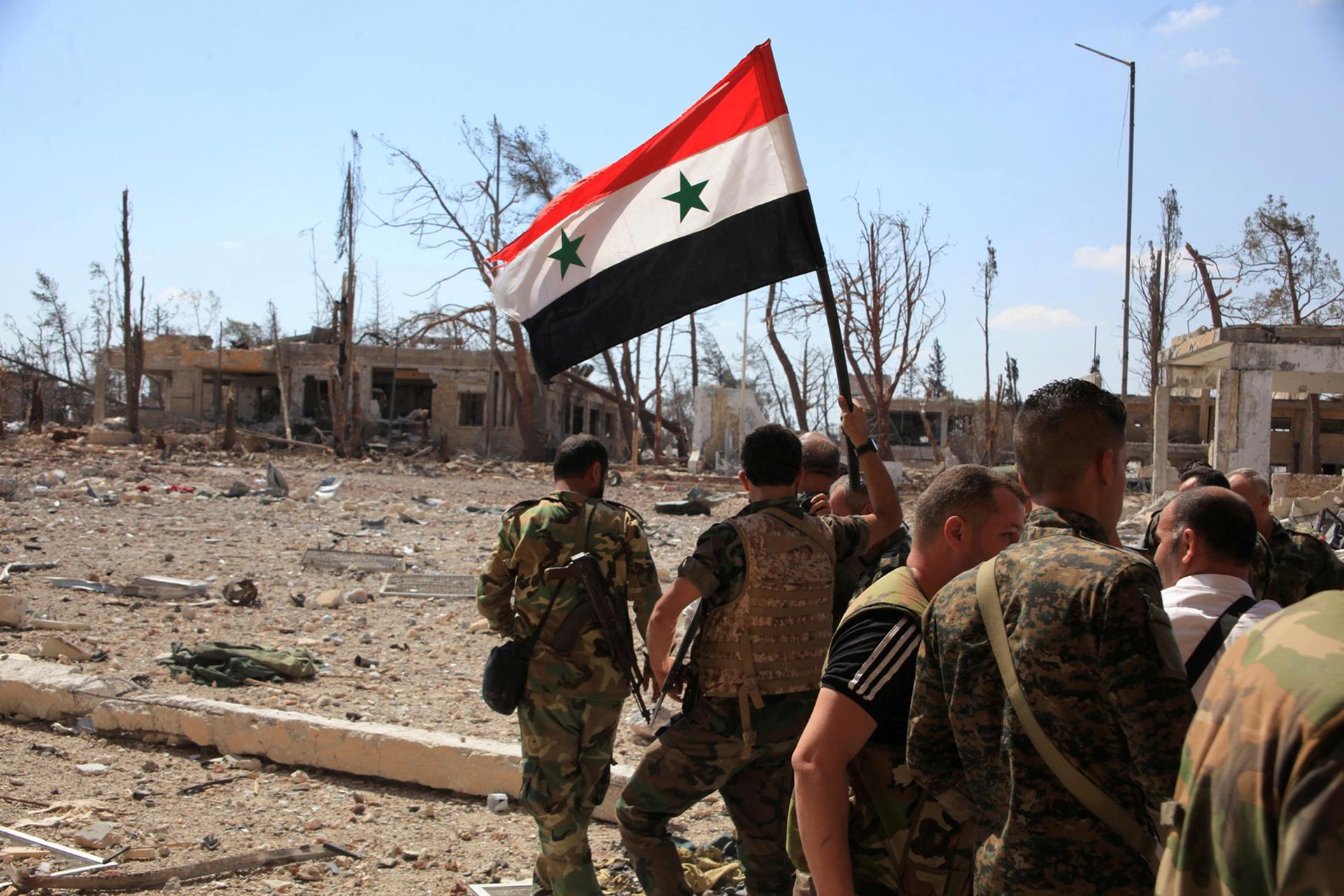Syria’s armed forces call end to US and Russia ceasefire
Forces loyal to Syria's President Bashar al-Assad walk at a military complex as one of them holds up a Syrian national flag, after they recaptured areas in southwestern Aleppo on Sunday that rebels had seized last month, Syria, in this handout picture provided by SANA on September 5, 2016.
Syria's armed forces said Monday that a week-long ceasefire brokered by the United States and Russia was over, blaming rebels for the failure of the truce.
US Secretary of State John Kerry said meanwhile that the terms had not been met for a key aspect of the deal — US-Russia cooperation against jihadists in Syria.
In a statement carried by state news agency SANA, Syria's army said a freeze on fighting it had announced last week had ended, blaming rebel groups it said, "did not commit to a single element" of the truce deal.
"Syria's army announces the end of the freeze on fighting that began at 7:00 p.m. on September 12, 2016, in accordance with the US-Russia agreement," the statement said.
The truce backed by world powers aimed to help end Syria's brutal five-year conflict, which has killed more than 300,000 people and displaced millions.
But after several days of relative calm, fighting escalated across major battlefronts, culminating in a deadly US-led air raid at the weekend on a Syrian army position and fresh strikes on Aleppo.
The truce "was supposed to be a real chance to stop the bloodshed, but the armed terrorist groups flouted this agreement," Monday's army statement said.
Syria's armed forces "exercised the highest degree of self-restraint while facing violations by terrorist groups," it said.
Kerry — who brokered the deal along with his Russian counterpart Sergei Lavrov — said in New York that Russia had failed to meet its side of a deal to enforce the truce, but that Washington was willing to keep working on it.
Under the terms of an agreement, the US military would set up a joint cell with Russian forces to target Syrian jihadists if the ceasefire held.
Kerry had earlier insisted the ceasefire was "holding but fragile".
He told reporters on the sidelines of the United Nations General Assembly that American officials were "meeting now with the Russians in Geneva. That process is continuing and we'll see where we are in the course of the day."
'Rebels didn't respect it'
However, Russia's defence ministry appeared to bury hopes that the truce would last past Monday night.
"Considering that the conditions of the ceasefire are not being respected by the rebels, we consider it pointless for the Syrian government forces to respect it unilaterally," Lieutenant General Sergei Rudskoy said in a televised briefing.
He said "the main issue" was that non-jihadist rebels had not been separated from Syria's former Al-Qaeda affiliate on the ground.
Violence increased across the country on Monday, with fierce clashes reported east of Damascus and one child killed in regime shelling on the edges of Aleppo.
Since September 12, 27 civilians, including nine children, have been killed in areas where the truce had been set to take hold, the Syrian Observatory for Human Rights said.
The bloodiest day for civilians was Sunday when a barrel bomb attack killed 10 in a southern rebel-held town and one woman died in the first raids on Aleppo since the truce started.
The ceasefire came under additional strain after a US-led coalition strike hit a Syrian army post-Saturday near the eastern city of Deir Ezzor, where government forces are battling the Islamic State jihadist group.
Syrian President Bashar al-Assad said Monday the coalition raid showed world powers support "terrorist organisations" like ISIS.
"The latest example of this is the flagrant American aggression on one of the Syrian army's positions in Deir Ezzor," he said.
Air raid was 'intentional'
Senior government adviser Buthaina Shaaban told AFP Sunday that Damascus believed the raid, which killed at least 62 Syrian soldiers, had been "intentional".
Loyalist forces backed by Russian and Syrian warplanes were fighting to roll back IS's advance there, a military source told AFP on Monday.
Under the US-Russia agreement, fighting was to have halted across Syria and humanitarian aid would reach civilians suffering increasingly dire humanitarian conditions.
On Monday, convoys of food and medical aid reached two hard-to-reach areas, according to David Swanson, a spokesman for the UN Office for the Coordination of Humanitarian Affairs.
Aid was delivered to tens of thousands in rebel-held Talbisseh, where at least two people were killed by shelling during the truce.
Another 78,000 people living in and around Greater Orum in the north of Aleppo province would also receive flour and health supplies, Swanson said.
But convoys to rebel-held districts of Aleppo were still stuck on the border with Turkey.
UN humanitarian chief Stephen O'Brien said he was "pained" that Aleppo had still not received promised aid deliveries.
The story you just read is accessible and free to all because thousands of listeners and readers contribute to our nonprofit newsroom. We go deep to bring you the human-centered international reporting that you know you can trust. To do this work and to do it well, we rely on the support of our listeners. If you appreciated our coverage this year, if there was a story that made you pause or a song that moved you, would you consider making a gift to sustain our work through 2024 and beyond?
